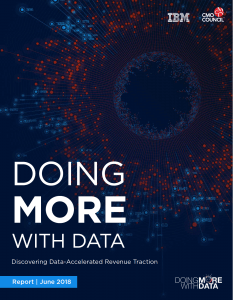|
|
 Whether you’re an executive at the source of product supply, in the engine room of shopper attraction, or at the point of commercial transaction, AI-enriched data analysis has now become an essential to customer engagement success.
Whether you’re an executive at the source of product supply, in the engine room of shopper attraction, or at the point of commercial transaction, AI-enriched data analysis has now become an essential to customer engagement success. Yet, one in four marketing, commerce and supply chain leaders admit that there is simply not enough time, budget or patience to unlock all of data’s potential, notes a new report from the Chief Marketing Officer (CMO) Council and IBM Watson Customer Engagement. The milestone study entitled, “Doing More with Data: Discovering Data-Accelerated Revenue Traction”, was released today.
To download the full report, please visit https://www.cmocouncil.org/thought-leadership/reports/doing-more-with-data
This turn to AI is not surprising considering the issues across data accessibility and quality that plague the organization’s ability to do much more with the data being amassed across systems. Thirty-seven percent of all executives surveyed feel that the current state of data accessibility is “hit or miss” at best, limited by selective connections across functions, systems and platforms. Once data is accessed, executives are further pressed to identify usable data as 39 percent of executives admit that data is often incomplete or only partially integrated across systems.
Among the top data issues executives highlight in the study:
- 68 percent of leaders admit that second and third party data is only partially or barely integrated into current data systems, providing an incomplete view of a connected customer’s relationship with a product or brand
- Dark data, defined for this study as unstructured, untagged and untapped data that has typically not been analyzed or processed, has frustrated stakeholders who are struggling to turn this data into actionable intelligence. Some 36 percent of respondents have yet to even tackle the issue of dark data while 30 percent admit that this valuable yet inaccessible data has emphasized how much the organization collects…but how little it actually uses.
- Instead of streamlining operations, data has forced teams to spend massive amounts of time managing, manipulating or manually exporting and importing spreadsheets and reports. Other operational black holes of mundane tasks include content management and tagging (a time drain for 66 percent of respondents), journey mapping (41 percent) and forecasting (56 percent)
“The question is not if data is important for any organization with customers…it is if the ability to do more with that data will mean the difference between engagement, profitability and success,” noted Liz Miller, SVP of Marketing at the CMO Council. “Each of the functions we surveyed have their own lens that colors and enhances their view into the organization’s data: Marketing, Supply Chain and Commerce will all interpret the subtle shadows and light differently, but in the end, they need to be looking at the same picture.”
While the disparate state of data has revealed gaps in both talent and technology, it is actually third “T” that has been most elusive: Time. Some 45 percent say that there are just not enough hours in the day to address all the transformation projects that are needed to activate data. But this is the exact issue that many executives hope new tools like AI can address and resolve, leveraging tools to ingest, analyze and recommend action in real-time, regardless of platform channel or functional owner.
Data for the study was compiled through an online survey in the second quarter of 2018.
The 107 page full report, now available by visiting https://www.cmocouncil.org/thought-leadership/reports/doing-more-with-data includes a key summary of findings, including analysis of differences in reaction and perception across marketing, commerce and supply chain executives, in-depth best practice interviews with leaders from brands including Nordstrom, Lamps Plus, REI, Ryder, The Body Shop, AT&T, TD Bank and more.
To learn more bout The Chief Marketing Officer (CMO) Council visit their website here.
